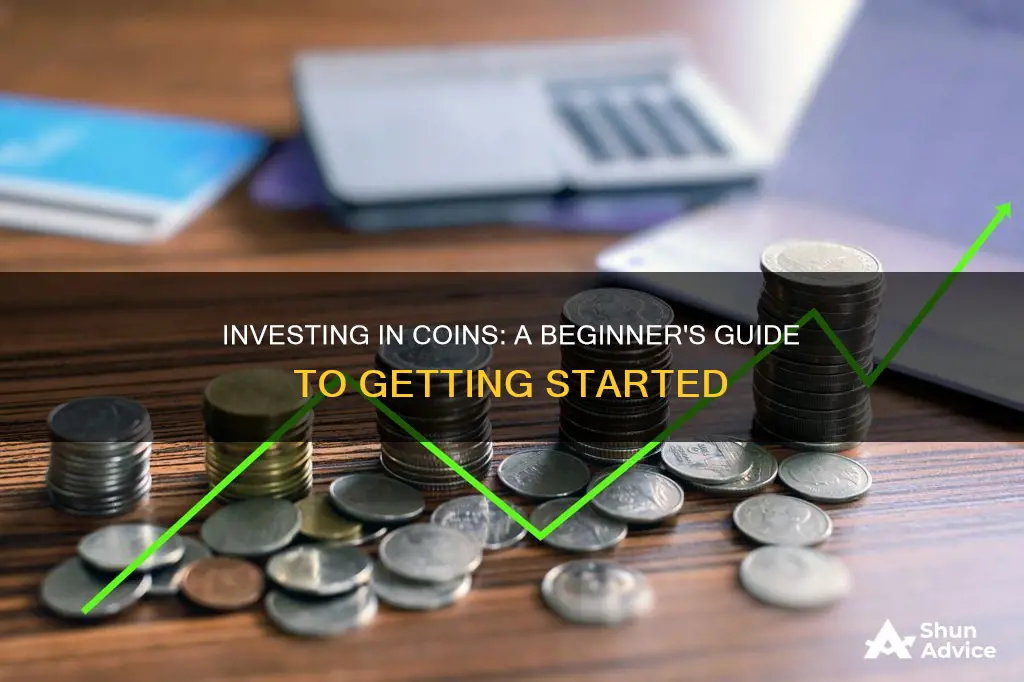
Investing in cryptocurrency is an increasingly popular option, with thousands of different cryptocurrencies now available. The most well-known cryptocurrency is Bitcoin, which was created in 2009 and is the original cryptocurrency. Other popular cryptocurrencies include Ethereum, Tether, Binance Coin, and Dogecoin. Cryptocurrencies are traded between consenting parties with no broker and are tracked on digital ledgers. There are several ways to invest in cryptocurrency, including through crypto exchanges, such as Coinbase, Kraken, or Gemini, or through brokerages, such as WeBull and Robinhood. It's important to note that investing in cryptocurrency carries risks, including potential financial loss due to volatile price swings.
| Characteristics | Values |
|---|---|
| How to buy cryptocurrency | You can buy cryptocurrencies through crypto exchanges, such as Coinbase, Kraken, or Gemini. Some brokerages, such as WeBull and Robinhood, also allow consumers to buy cryptocurrencies. |
| How much it costs to buy cryptocurrency | The cost depends on the type of crypto you are buying. Many small altcoins trade for a fraction of a cent, while a single bitcoin will cost tens of thousands of dollars. |
| How to store cryptocurrency | Cryptocurrency can be stored in a crypto wallet, such as a hot wallet or cold storage. |
| How to choose the best crypto to invest in | When choosing the best cryptocurrency to invest in, consider your individual goals, investing timeline, and risk profile. |
| How to report crypto on taxes | Cryptocurrency is treated as a capital asset, like stocks, so if you sell cryptocurrency at a profit, you'll have to pay capital gains taxes. |
What You'll Learn

Choosing a platform
Reputation and Trustworthiness
It is essential to choose a platform that has a solid reputation and is trusted by many users. Look for platforms with a long-standing presence in the market and those that are widely recommended by the crypto community. Reputable platforms are more likely to offer better security, transparency, and user protection.
Security
The safety of your investments is paramount. Always opt for platforms with robust security protocols and measures in place. Two-factor authentication, cold storage for crypto assets, and encryption are some of the security features to look out for. Additionally, research the platform's history to ensure they have no frequent security breaches or hacking incidents.
Supported Cryptocurrencies
Different platforms offer varying selections of cryptocurrencies. Identify the coins you are interested in investing in and ensure that the platform supports them. For example, if you want to invest in Bitcoin, Ethereum, or Dogecoin, confirm that the platform facilitates the trading of these specific coins.
Fees and Charges
Each platform has its own set of fees and charges associated with trading, depositing, and withdrawing funds. These fees can vary significantly, so it's essential to understand them before signing up. Compare the fee structures of different platforms and choose one that aligns with your investment strategy and budget. Some platforms may offer zero trading fees or discounted rates for specific cryptocurrencies.
User Interface and Functionality
The user interface and functionality of a platform can significantly impact your trading experience. Look for a platform with a user-friendly interface that is easy to navigate and provides all the necessary tools for trading. Some platforms offer advanced features such as real-time order books, charting capabilities, and in-depth market analysis tools. Ensure the platform suits your level of trading expertise.
Regulatory Compliance
Due to the evolving nature of the cryptocurrency market, it is essential to choose a platform that complies with regulatory requirements. Regulatory compliance helps protect investors and ensures that the platform adheres to specific security and transparency standards. Check the platform's website for information on their regulatory status and any licenses or registrations they hold.
Customer Support
Opt for a platform that offers reliable and responsive customer support. This is crucial, especially if you're new to crypto investing. Look for platforms that provide multiple channels of communication, such as live chat, email, and phone support. Additionally, consider the availability of educational resources and tutorials to help you get started.
Geographical Restrictions
Some platforms may have geographical restrictions on who can use their services. Before signing up, ensure that the platform is available in your country or region. This information is usually available on the platform's website or terms of service.
Reviews and Feedback
Take the time to read reviews and feedback from other users who have used the platform. This can provide valuable insights into the platform's reliability, user experience, and potential red flags. Consider both positive and negative reviews to make an informed decision.
Remember, it is always a good idea to diversify your investments across multiple platforms and cryptocurrencies to mitigate risk. Conduct thorough research and due diligence before committing your funds.
Bitcoin Cash: Smart Investment or Risky Bet?
You may want to see also

Understanding the risks
Investing in coins, whether rare physical coins or cryptocurrencies, comes with a variety of risks that you should understand before making any investment decisions. Here are some key points to consider:
Volatility and Market Fluctuations
The value of coins, especially cryptocurrencies, can be highly volatile and subject to extreme changes over short periods. Coin prices can fluctuate significantly due to various factors such as supply and demand, celebrity endorsements, social media trends, and online communities. While prices can surge due to hype or increased demand, they can also crash rapidly if popularity wanes or negative sentiments arise.
Speculative Nature
The values of coins, particularly meme coins and other cryptocurrencies, are often speculative and may not have a clear use case or intrinsic value. Their worth is primarily based on market sentiment, hype, and community engagement rather than fundamental factors. This speculative nature adds to the overall riskiness of investing in coins.
Counterfeit and Altered Coins
When investing in rare physical coins, there is a risk of encountering counterfeit or altered coins. These are coins that have been doctored or modified to conceal defects or misrepresent their condition and value. While experts can usually detect these alterations, beginners may be fooled. It is crucial to only purchase coins from reputable dealers and ensure they are certified by recognised grading services.
Scams and Fraud
The cryptocurrency space is rife with scams and fraudulent activities. Crypto scammers often use social media and unsolicited offers to target unsuspecting investors, especially minorities and young people. They may promise high returns or use phrases like "Get Rich Quick" to lure people into investing. It is important to be wary of such schemes and remember that if something sounds too good to be true, it probably is.
Regulatory and Security Risks
Cryptocurrencies are not regulated like traditional stocks or insured like money in banks. This lack of regulatory oversight and consumer protection can expose investors to potential losses without recourse. Additionally, cryptocurrency storage applications (hot wallets) and exchanges are vulnerable to cybersecurity breaches and theft, posing a risk to your digital assets if not properly secured.
Lack of Diversification
Investing in rare physical coins or a single cryptocurrency can lead to a lack of diversification in your investment portfolio. Diversification is essential to manage risk effectively. It is generally recommended to spread your investments across various asset classes and sectors to reduce the impact of any single investment on your overall financial health.
Time Horizon
Investing in rare coins or certain cryptocurrencies may not be suitable for short-term gains. The value of rare coins can take time to appreciate, and strategies like coin flipping come with significant risks. Similarly, the speculative nature of cryptocurrencies means their prices can fluctuate dramatically over time, making them more suitable for long-term investment horizons.
In conclusion, investing in coins, whether rare physical coins or cryptocurrencies, carries significant risks that all investors should carefully consider before making any decisions. It is essential to conduct thorough research, understand the market dynamics, and only invest what you can afford to lose.
Strategic Investment: Dodgecoin's Potential and Your Portfolio
You may want to see also

Exploring different coins
When it comes to investing in coins, there are two main types: cryptocurrency and rare coins.
Cryptocurrency
Cryptocurrencies are digital currencies that are not backed by real assets or tangible securities. They are traded between consenting parties with no broker and tracked on digital ledgers. The most well-known cryptocurrency is Bitcoin, which was created in January 2009 and is currently the largest cryptocurrency by market capitalization. Other popular cryptocurrencies include Ethereum, Tether, Binance Coin, and Dogecoin. These cryptocurrencies are built on blockchain technology, which allows for secure and decentralized transactions.
Rare Coins
Rare coin investing can be a profitable venture, but it is important to note that it is a long-term investment strategy. The value of a rare coin is influenced by its rarity, condition, and demand. Rare coins can be made from precious metals such as gold or silver, which gives them intrinsic value. Additionally, the fewer examples of a coin that were minted, the higher its collector value tends to be. Rare coins can also be antique coins or coins with minting errors, which can add to their value.
Key Differences
Cryptocurrencies are decentralized and exist solely in digital form, while rare coins are physical assets that can be collected and traded. Cryptocurrencies are also subject to high volatility, with frequent periods of dramatic price fluctuations, while rare coins are generally considered a non-volatile asset type.
Retirement Planning: Is Bitcoin a Good Investment Option?
You may want to see also

How to buy
To buy cryptocurrency, you'll need to sign up for a crypto exchange platform. Some of the most popular platforms include Coinbase, Kraken, Bitstamp, Gemini, Binance, and Bitfinex. You'll also need to decide which cryptocurrency you want to buy.
- Choose an account type: Different account types may be available, so be sure to select one that aligns with your goals.
- Verify your identity: Most platforms will require you to submit a government-issued photo ID or other proof of identification.
- Read and agree to the terms of service: Each platform has its own rules and fees, so be sure to understand them before signing up.
- Link a bank account: You'll need to connect your bank account or another payment method to facilitate deposits and withdrawals.
- Fund your account: Decide how much money you want to start with and transfer it into your new account.
Once you have a crypto exchange account set up, you can start buying and selling cryptocurrency. It's important to remember that the crypto market is highly volatile and unpredictable, so there are risks involved. Be sure to do your research and only invest what you can afford to lose.
In addition to exchange platforms, you can also buy cryptocurrencies through apps such as Cash App or brokerages like WeBull and Robinhood.
IRA Funds and Bitcoin: A Smart Investment Strategy?
You may want to see also

Crypto wallets
Hot wallets are digital tools that are usually accessible from a phone or desktop computer. They are more susceptible to cyberattacks because they are always online. Examples of hot wallets include the Coinbase Wallet, MetaMask, and TrustWallet.
Cold wallets, on the other hand, store your digital keys offline, such as on a USB drive or a sheet of paper. They are harder for malicious users to access but are limited in function and are at risk of being lost or destroyed. Examples of cold wallets include Ledger, Ellipal Titan, and SafePal.
When choosing a crypto wallet, it is important to consider factors such as security, functionality, and cost. It is also essential to evaluate your trading frequency, the types of crypto you want to trade, your budget, and the specific functionality you require.
Boost Coin: A Good Investment Choice?
You may want to see also
Frequently asked questions
You can buy cryptocurrencies through crypto exchanges, such as Coinbase, Kraken, or Gemini. Some brokerages, such as WeBull and Robinhood, also allow consumers to buy cryptocurrencies.
Cryptocurrency is a speculative investment with significant volatility in price. There is also a lack of regulatory infrastructure, meaning investors are entirely responsible for the security of any cryptocurrency spot holdings.
Some investors are attracted to the volatile price swings of cryptocurrency as a potential for profit. Some also believe that cryptocurrency could add diversification to a portfolio due to its lack of correlation with other asset classes.







